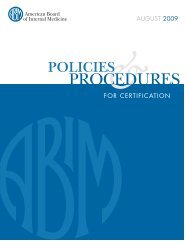The SRA Symposium - College of Medicine
The SRA Symposium - College of Medicine
The SRA Symposium - College of Medicine
You also want an ePaper? Increase the reach of your titles
YUMPU automatically turns print PDFs into web optimized ePapers that Google loves.
Licensure – a mandatory legal requirement for certain pr<strong>of</strong>essions in order to protect the public<br />
from incompetent practitioners. Licensing procedures are generally established or implemented by<br />
a political governing body that prescribes practice without a license.<br />
According to various authors (Bratton & Hildebrand, 1980; Mason, 1984; Galbraith & Gilley, 1986;<br />
McCue, 2003) certification is a voluntary achieved standard <strong>of</strong> excellence for an individual practitioner<br />
recognized by a peer group. <strong>The</strong> focus <strong>of</strong> this study falls under this category <strong>of</strong> credentialing<br />
identified in the literature as pr<strong>of</strong>essional certification.<br />
<strong>The</strong> Research Administrators Certification Council (RACC) was formed in conjunction with the<br />
Society <strong>of</strong> Research Administrators International (<strong>SRA</strong>) in 1993 with the primary purpose <strong>of</strong> certifying<br />
that an individual, through experience and testing, has the fundamental knowledge necessary<br />
to be a pr<strong>of</strong>essional research or sponsored programs administrator (Research Administrators<br />
Certification Council, 2004). Since the RACC was formed in 1993, 501 research administration<br />
pr<strong>of</strong>essionals have achieved certification (Research Administrators Certification Council).<br />
This study sought to determine whether those who have attained the Certificate in Research Administration<br />
(CRA) perceive a benefit to their careers and why most research administrators do<br />
not attempt certification. <strong>The</strong> primary research question studied is concerned with the relationship<br />
between perceived value <strong>of</strong> the CRA to research administration pr<strong>of</strong>essionals and demographic<br />
characteristics. Five research questions guided the investigation.<br />
Statement <strong>of</strong> the Problem<br />
<strong>The</strong> value <strong>of</strong> certification in the field <strong>of</strong> research administration is not known. Research administration<br />
pr<strong>of</strong>essionals do not know whether certification has benefited the careers <strong>of</strong> those who<br />
have achieved it, or why most research administrators do not attempt certification. <strong>The</strong> primary<br />
focus <strong>of</strong> the study was concerned with the relationship between perceived value <strong>of</strong> the Certificate<br />
in Research Administration (CRA) to research administration pr<strong>of</strong>essionals and demographic<br />
characteristics.<br />
Methodology<br />
An Internet-based survey instrument was developed to collect data from certified research administrators<br />
(CRAs) and non-certified research administrators. <strong>The</strong> survey collected demographic<br />
information to help describe the relationship between the demographic characteristics <strong>of</strong> the population<br />
and perception <strong>of</strong> value. A pilot study was conducted to determine the survey instrument’s<br />
work under realistic conditions. <strong>The</strong> survey instrument was then distributed via an electronic mail<br />
notification and included a link to an Internet site where the survey could be completed online.<br />
Three electronic mail requests followed by personal telephone calls to those who did not respond<br />
to the electronic mail requests resulted in a return <strong>of</strong> 230 usable surveys or an 83% rate <strong>of</strong> return.<br />
Population and Sample<br />
Papers<br />
<strong>The</strong> population <strong>of</strong> respondents for this study included research administrators based in the Southeastern<br />
region <strong>of</strong> the National Council <strong>of</strong> University Research Administrators (NCURA). According<br />
to the NCURA (2005), 1,101 members are based in the Southeastern region.<br />
A list <strong>of</strong> 501 research administrators who have achieved certification was obtained from the Research<br />
Administrators Certification Council (RACC), and the list revealed that 147 <strong>of</strong> the research<br />
administrators who have achieved certification are from the Southeastern region <strong>of</strong> the NCURA.<br />
<strong>The</strong>se 147 individuals were selected to represent half <strong>of</strong> the overall sample population for this<br />
study. <strong>The</strong> other half <strong>of</strong> the sample population was randomly selected from a list <strong>of</strong> non-certified<br />
members based in the Southeastern region.<br />
2005 <strong>Symposium</strong> Proceedings Book 223

















